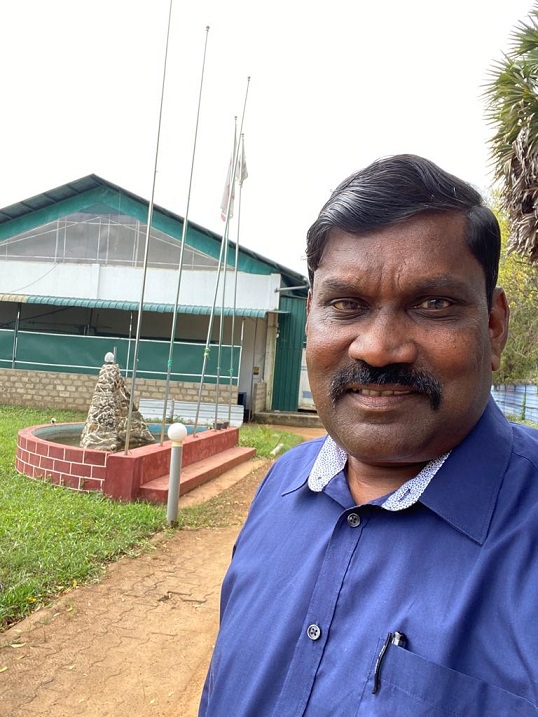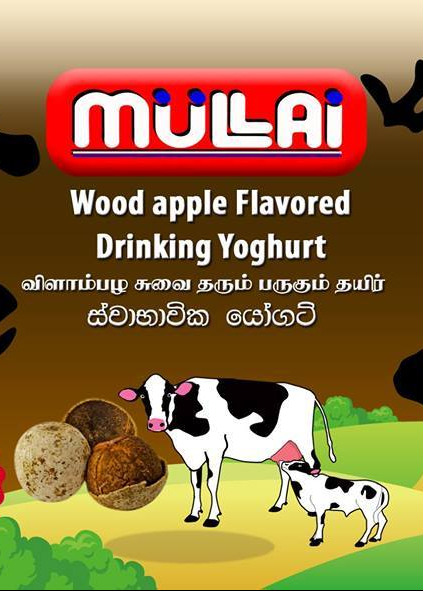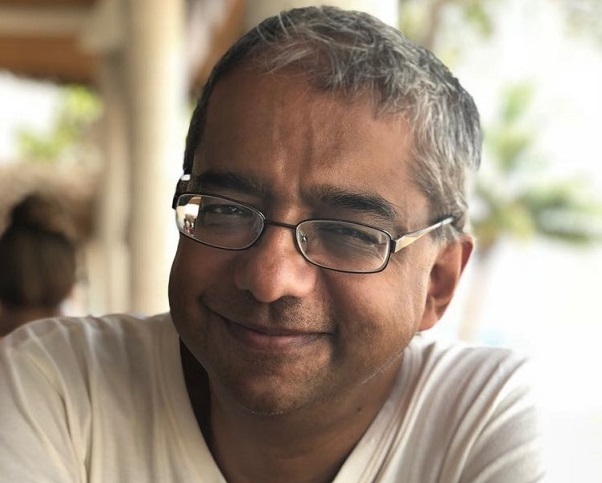By Jekhan Aruliah
Mr S.Thavaseelan, known as Seelan, was born in Kayts a town at the Northern end of Jaffna’s Velanai Island. His father, who delivered letters for the Ceylon Post Office, died when Seelan was 4 years old. He left the young family with a government pension which his mother supplemented doing other jobs. The family went to stay with Seelan’s mother’s parents in Puthukkudiyiruppu Mullaitivu. Seelan grew up here, going to school from Year 4 until he entered higher education, returning to Jaffna as an undergraduate at Jaffna University. Completing his degree in 1986, Seelan started his career as a teacher of maths. In 1990, due to the ongoing civil war, Seelan left to take up a post as a maths teacher in Zambia. He expected to return after a couple of years thinking the war would end sooner than it ultimately did. In 2001, with the Sri Lankan war still raging, Seelan successfully applied for a job in the United Kingdom. Here he worked as a maths teacher at the North Kent College’s Gravesend Campus. Ending his teaching career, Seelan opened a fried chicken restaurant, an off-licence and a supermarket. Here he learned the business skills he would bring back to Sri Lanka.

In 2016 Seelan decided to return to his hometown in Mullaitivu. His wife remained in the UK with his four children. Now three have graduated with degrees in Politics, Digital Media, and Architecture. Two work for a film production company in London, one of them took a Master’s in Digital Media. The third is doing a Master’s degree in architecture. His wife continues to bring up their young daughter in school studying for her O’Levels. Seelan, having ensured the financial security of his family in England, wanted to use his business skills to do something in his homeland.
Investing in Milk
Seelan had inherited from his mother one acre of “permit land”. Permit Land, explained to me very simply, is state land granted to individuals which they can pass on to their heirs but not to anyone else. They cannot sell the land. Lenders will not accept the land as collateral for loans because ownership cannot be transferred to the lender in case of repayment default. There is a procedure to apply to convert Permit Land into Freehold. But this procedure is fraught with delay with Seelan’s application still pending since 2017.
Wanting to start a business on this land, Seelan focused on milk products which are the single most costly food import to Sri Lanka. Central Bank of Sri Lanka figures for 2021 show Rs62 billion of milk and milk products were imported in 2020, mainly from New Zealand, India and the European Union. This is about 20% of all food imports for that year.
While Seelan had learned business in the UK, he knew nothing about the dairy industry. He spent two years travelling around to learn about producing and processing milk, visiting India, China, Japan and Malaysia. One of his friends is a food processing plant engineer with great experience working for dairy companies. Together they built the milk processing plant on Seelan’s Mullaitivu land.
Seelan had an advantage setting up business in Puthukkudiyiruppu. His family has been known and trusted for generations. He was not hindered by suspicion of the ‘newcomer’. Without much trouble he persuaded the farmers to supply him with milk. He gave continuous direct employment to 25 young people from the farmers' families working in his plant, rising to 32 in peak season. Employing their youth strongly cemented his link with the farmers. These young employees would spread the word into their communities that they were working for a good employer producing healthy foods and drinks. Farmers supplying Mullai with quality milk was good for their own families.
Mullai value added products
Mullai uses only natural preservatives and no chemical additives. This means they have a lifespan of just one month unopened, lower than many other milk products which can last up to 6 months unopened. This isn’t a problem said Seelan. Products are delivered to the retailers within five days, who sell them within five days, and are consumed within five days. A total of 15 days is well within the “sell by date”. What isn’t sold by the supermarket is returned, and returns have fallen to very low levels as the products have gained popularity.

His customers are local supermarkets across Sri Lanka in the Northern, Eastern and Central Provinces and in Colombo. There is high demand from the fishermen in Mannar, who take the drinking yoghurt as food for their fishing trips. Demand particularly in Colombo is greater than Mullai can supply, which is a challenge Seelan has plans to address.
Greatest Challenges
Bureaucracy: Getting permission to start the business in the first place was a great challenge. Applying for anything is a problem many face in Sri Lanka: from simply applying for a bank account or passport, to getting planning permission, to starting a business. The bureaucracy drip feeds information. When they check a form, they will stop at the first problem and send you away to fix it. They won’t tell you everything you need in one go. Each time they will tell you of yet another document you need to submit. When you come back with it, they will tell you about the next document. Even if you explicitly ask for “everything needed” there will be something missing. And once “everything” has been submitted there will be something on the submitted form that is not quite right, requiring it to be filled again. Back and forth, wasting time and energy and straining the sheer will to carry on.
Working culture: When Mullai started, its Northern workers were used to being ‘day labourers’. They think their engagement finished at the end of the day when they get their money. Whether they turned up the next day was a matter of chance. They didn’t end the work one day leaving things ready to restart the next. They didn’t see their job as a long term commitment. This made training them for higher quality and productivity and greater skills hard. It took some time for this attitude to change, for the workers’ commitment to Mullai to match Mullai’s commitment to them. Now things are different, most of the staff have stayed for three or more years.
The workers are confident they will have a reliable ongoing source of income, the company is confident it will have workers whose skills it can invest in for the long term. Both parties can plan their lives and the business into the future.
Finance: Raising finance is a severe issue. The banks’ application process is complicated even for Seelan, a teacher of maths with years of business experience in the UK. Low cost agricultural loans (currently around 4% per annum) are available but difficult to get. As his land is Permit Land the banks won’t accept this as collateral because they can’t take possession and sell the land in case of default.
Raw materials: The dairy farmers are a reliable but inadequate source of milk. Mullai’s capacity is to process 5,000 litres of milk per day. However the farmers can only provide 1,500 litres per day at peak in October. This falls to 500 litres per day in January to February. This slack period is during calving season when the milk is left for the newly born young. And the rainy season when the cows get muddy making it more difficult to get them clean for milking. Seelan has plans to address this supply issue.
Plans for the future
Seelan plans to increase his milk supply, to close the gap between his processing capacity, by setting up his own herd of cows. He wants to buy 50 acres of land in Mullaitivu anywhere near fresh water. He will invest in 75 cows, each producing on average 10 litres of milk per day. To do this he estimates he needs Rs50 million, which is not easy to get from the banks. Therefore he is interested in a sleeping partner. Offering equity on the basis they will leave him to run the business without interference, just enjoying the dividends.
Seelan plans to extend the Mullai product range currently made up of fresh milk; natural and drinking yoghurt; curd; milk toffee. Mullai will start offering new flavours, including palmyrah flower milk toffee. He is working with Jaffna University's University Business Link to introduce a new flavour. Mullai will start producing butter and cheeses, including a type of Norwegian style cheese based on advice from a Diasporan in that country. Knowing that some households still don’t have fridges, Mullai will start offering condensed milk which can be stored in a cupboard even after opening.
Mullai, whose products are currently only available in Sri Lanka, will also be extending its customer base internationally. Exporting products including milk toffee and ghee.
University Business Link
Dr Eswaramohan, a senior lecturer at Jaffna University’s Department of Zoology, introduced me to Seelan. Eswaramohan is the Director of the Jaffna University branch of University Business Link (UBL). UBL is an initiative by Sri Lanka's University Grants Commission (UGC) that commenced in 2016 to link academic research and innovation to external commercial companies. Jaffna University’s first business linkage is with Mullai, where an extract of the Bael fruit is used as a flavouring for drinking yoghurt.
Seelan’s advice for Diaspora considering investing in the North
It is very valuable for Sri Lanka for Diaspora to bring their skills, knowledge, network, and funds to rebuild the North. Northern recovery has been slow after decades of lost people, lost progress and lost opportunities. Seelan offered the following advice:
To invest directly in your own business you must come and stay with your investment for at least three years. Whatever the industry, that’s the minimum it takes to stabilise your business including recruiting, identifying and training the leading staff to take your business forward. You won’t get things right quickly. You must be patient and resolute.
Even without returning to the North or investing your money, you can still provide a link to international export markets. Advise on who wants what, how to gain market access and help build channels. Help make connections between suppliers in the North and customers overseas. Nothing fancy, maybe the ethnic supermarkets down your highstreet in London or Toronto.
Be ready to invest as a ‘sleeping partner’. Agree on regular reports from the entrepreneur, offer your feedback and advice. But don’t interfere with the business. Once you trust the entrepreneur enough to invest your money, leave the business decisions to her.
Don't become a disruptive distraction.
You can contact Seelan at mullai.ig@gmail.com
( — The writer Jekhan Aruliah was born in Sri Lanka and moved with his family to the UK when he was two years of age. Brought up in London, he graduated from Cambridge University in 1986 with a degree in Natural Sciences. Jekhan then spent over two decades in the IT industry, for half of which he was managing offshore software development for British companies in Colombo and in Gurgaon (India). In 2015 Jekhan decided to move to Jaffna where he is now involved in social and economic projects. He can be contacted at jekhanaruliah@gmail.com — )


Well done Jegan. Keep up the good work. Congratulations to Seelan. Please request to contact me ASAP.
Congrats Aiya, our hearts are with you and your people.
Very creative, enterprising and self believing , the hallmark of a Thamil entrepreneur.Well done Seelan
The Communal Sinhal govts can’t keep the hardworking, and committed Tamils, down. My friend Jekhan is a good example of a dutiful son who gave up comfortable life in the UK to do his bit to improve the lot of his fellow Tamils. May all his efforts and .of other committed people like Seelan keep going successfully! Balendran.
Yours is a communal comment, is that not so Mr Balendran? Is there no communalism and casteism among the Tamils?
spot on!